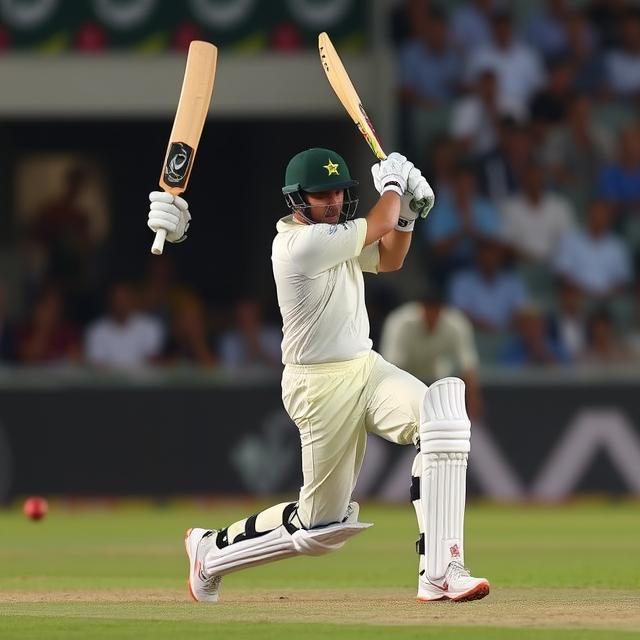Cricket Team Protocol: A Deep Dive into Pakistan’s Approach

Cricket Team Protocol: A Deep Dive into Pakistan’s Approach
Unveiling the strategies and procedures that propel Pakistan’s cricket team to victory. Discover the intricate details behind their meticulous approach to the game, from training methodologies to player psychology.
Click here to learn more!
Pakistan’s cricket team has a rich history, marked by both exhilarating victories and heart-wrenching defeats. Understanding the nuances of their team protocol provides valuable insight into the factors contributing to their on-field performances.
The Foundation: A Culture of Discipline
At the heart of any successful cricket team lies a strong foundation of discipline and commitment. Pakistan’s protocol emphasizes a strict adherence to training schedules, dietary requirements, and overall team conduct. This commitment extends beyond the playing field, impacting every facet of the players’ lives, fostering a unified and dedicated environment.
The team’s management plays a crucial role in upholding these standards. Well-defined roles, responsibilities, and clear communication channels ensure that everyone understands their individual and collective objectives. This structure empowers the players, allowing them to focus on their respective roles and responsibilities within the team framework.
Training Protocols: Mastering the Craft
Pakistan’s training regimen is meticulously crafted to enhance the players’ skills and physical capabilities. It involves a blend of technical drills, strategic simulations, and rigorous fitness training designed to optimize performance under pressure.
The protocols incorporate diverse training methods, addressing different facets of the game—from mastering batting techniques to honing bowling strategies and refining field placements. Technology is integrated where appropriate, ensuring that players remain at the cutting edge of the game.
A significant aspect of their training protocol involves adapting to varied conditions. Whether playing on challenging pitches in the subcontinent or navigating overseas conditions, players undergo meticulous preparation to optimize their performance.
Strategic Planning and Match Preparation
Pakistan’s cricket team doesn’t merely rely on instinct; strategic planning is paramount. Pre-match analysis, including opponent scouting and evaluation of playing conditions, is a critical part of their protocol. Detailed reports and assessments form the basis of tactical decisions, empowering the team to formulate effective game plans.
The team’s protocol incorporates detailed game plans, emphasizing both offensive and defensive strategies. These plans are not static; they are adaptable, responding dynamically to the unfolding events on the field. Coaches and captains work collaboratively to ensure that the team maintains a clear understanding of the tactical objectives throughout the match.
Pre-match rituals, while often perceived as superstition, can serve as a crucial psychological tool. These rituals, tailored to individual players, help establish a sense of routine and mental preparedness.
Player Welfare and Psychological Support
Recognizing the immense pressure and demands placed on cricket players, Pakistan’s protocol emphasizes player welfare. This encompasses physical well-being, emotional support, and mental conditioning. A dedicated support staff, including psychologists and counselors, assists players in managing stress, anxiety, and maintaining mental resilience.
The protocol fosters an environment of mutual respect and trust among players. A strong sense of camaraderie and teamwork is nurtured, allowing players to support one another during challenging moments and celebrate successes together. This fosters an optimistic and collaborative environment.
Adaptability and Continuous Improvement
Pakistan’s cricket team protocol isn’t static; it’s a dynamic process, constantly adapting and evolving. Feedback from coaches, players, and analysts are meticulously examined to identify areas for improvement. Lessons learned from matches, both victories and losses, are analyzed to enhance future performance. This allows the team to remain competitive in a rapidly evolving sport.
The protocol emphasizes learning from past experiences. Mistakes are not viewed as failures, but as opportunities for growth. The team is constantly evaluating its approach, seeking innovative ways to enhance its strategies and techniques.
Cultural Considerations
Pakistani culture plays a significant role in shaping the team’s protocol. The inherent passion for cricket runs deep within the nation, creating a strong sense of national pride. The pressure and expectations of the fans greatly influence the players’ motivations and aspirations.
This cultural context shapes the team’s approach to the game, from the rituals observed before matches to the celebrations after victories. The team often draws upon cultural traditions to foster a sense of unity and camaraderie.
The role of family and community also plays a part. Many players carry the weight of familial and societal expectations, which can sometimes influence their decision-making process. However, the protocol needs to strike a balance between honoring these values and ensuring players prioritize their professional commitment to the team.
Conclusion: A Holistic Approach
Pakistan’s cricket team protocol is a multifaceted approach encompassing meticulous training, strategic planning, psychological support, and a strong cultural foundation. It’s a dynamic system designed to optimize individual and collective performance. By combining meticulous preparation with the unwavering spirit of the Pakistani people, the team strives to reach its full potential.
The protocol acknowledges that cricket is not just a game; it’s a reflection of national pride, a source of inspiration, and a platform for cultural expression. The success of Pakistan’s cricket team hinges on a combination of technical proficiency, tactical acumen, and a deep-rooted commitment to excellence.
In conclusion, understanding this intricate framework provides insights into the factors contributing to Pakistan’s on-field success and ultimately enhances our appreciation of the complexities involved in modern-day sportsmanship. The team’s future success depends on their ability to continue evolving their protocol, adapting to the ever-changing landscape of international cricket, and inspiring future generations of Pakistani cricketers.